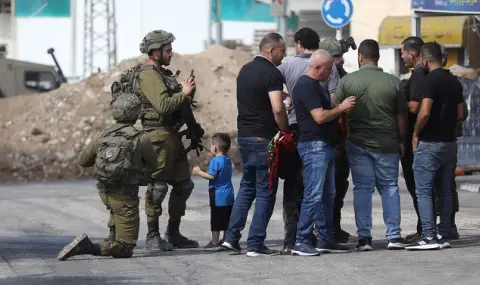As Israel prepares to release more than 1,000 Palestinian prisoners in exchange for Israeli hostages, experts and grieving families are questioning the security and justice implications of releasing the prisoners, many of whom are serving life sentences for murder, the Israeli news agency TPS reported, quoted by BTA.
"This part of the agreement with "Hamas" sends a signal to the terrorists that violence pays off, undermining the sacrifices of the soldiers and civilians who gave their lives for the country," Herzel Hajai said.
His daughter, Lieutenant Shir Hajai, was one of four soldiers killed in 2017. in a truck attack in Jerusalem. Hadjai leads the "Choice of Life" forum, which brings together hundreds of Israeli families of victims of terrorist attacks.
Security analysts have warned the TPS of a potential wave of terrorism following the release of terrorists.
"Any such deal boosts the morale of terrorist organizations. It's not just about human resources; it's about showing their supporters that their methods work and that Israel can be pressured to release high-ranking prisoners," explained Menashe Nahum. Nahum has extensive experience running Israel's maximum-security prisons, including a decade at Israel's largest prison, Ramon.
"We have seen how released terrorists quickly reintegrate into their networks, sometimes even taking on leadership roles. In some cases, they are staging attacks within months of their release. This is not speculation, this is a documented reality," Nahum said.
Many of the 1,027 terrorists released in the 2011 Gilad Shalit swap have returned to terrorism, including Yahya Sinwar, who led the attacks of October 7, 2023. Ronen Bar, head of the Israeli security agency (Shin Bet), reportedly told government ministers in January that 82% of the prisoners released for Shalit had returned to terrorist activity.
The complaint, filed by the "Choice of Life" Forum against the release of 292 terrorists serving life sentences was rejected by the Supreme Court, which saddened the families of the victims.
"They are bursting with rage, with fear. They have no choice but to protest, to scream, but no one pays attention to them. This decision devalues the life of every Israeli victim of terrorism. This is not just a security issue - it is a moral failure," said Hajjaj.
Nahum knows personally many of the terrorists who are about to be released from prison.
Among those expected to be released on Saturday is Zakaria Zubeidi, a former commander of the Al-Aqsa Martyrs Brigades in Jenin, responsible for many terrorist attacks. In 2002 six people were killed when terrorists led by Zubeidi attacked the Likud party branch in Beit Shean with guns and grenades while party members were voting in an election.
"The Shin Bet has marked him as a potential leader of ""Fatah". Zubeidi knows Judea and Samaria well, knows Israelis and has built a wide network of connections. Ruthless and cunning, he is the mastermind behind the daring escape from Gilboa prison. He will cause considerable trouble," Nahum explained.
Another terrorist to be released as part of the deal is Mahmoud Atalla, sentenced to life in prison for the murder of a Palestinian woman he suspected of collaborating with Israel. In September, Atalla was charged with raping a female soldier working at Gilboa prison and sexually assaulting another guard. The case became a major scandal when information emerged that prison officials had turned a blind eye to the attacks.
"He is a cruel man, a Zubeidi soldier who seeks to serve the interests of his people through terror," Nahum said of Atala.
Another terrorist on the list, who is expected to be released later as part of the deal, is Mohan Ashrin, who in 2002 organized a suicide bombing at the Park Hotel in Netanya on Passover night. The attack killed 30 people and injured 160.
"Imagine someone like him returning to Qalqilya, Nablus or Ramallah. The burden of a man like him, who carried out one of the worst terrorist attacks on Passover night, is enormous," Nahum said.
David Mentzer, a spokesman for the National Public Diplomacy Directorate in the Prime Minister's Office, said the agreement to release Palestinian prisoners was painful, adding that it was necessary to secure the return of Israeli hostages. "These convicted murderers will not be allowed to return to Judea and Samaria or to Israel. They will be sent to third countries, and we will take steps to minimize the risk they pose," he added.
The first phase of the ceasefire will see the release of 33 Israeli hostages over several weeks in exchange for hundreds of Palestinians in Israeli prisons. The exact number will depend on how many of the 33 hostages are still alive. Three of them have already been released, and four more are due to return on Saturday.
"The emotional desire to bring the hostages home is undeniable. But as a nation, we must weigh this against the long-term security of every citizen. The most difficult decisions are those where every choice has a price," Nahum said.
At least 1,200 people were killed and 252 Israelis and foreigners were taken hostage in the October 7, 2023, Hamas attacks on Israeli communities near the Gaza border. Of the remaining 94 hostages, more than 30 are reported dead.
